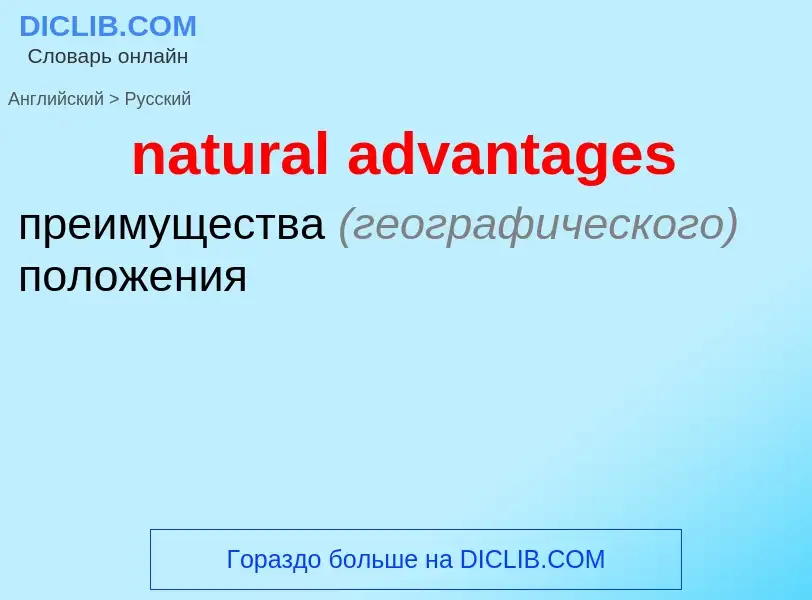Μετάφραση και ανάλυση λέξεων από τεχνητή νοημοσύνη
Σε αυτήν τη σελίδα μπορείτε να λάβετε μια λεπτομερή ανάλυση μιας λέξης ή μιας φράσης, η οποία δημιουργήθηκε χρησιμοποιώντας το ChatGPT, την καλύτερη τεχνολογία τεχνητής νοημοσύνης μέχρι σήμερα:
- πώς χρησιμοποιείται η λέξη
- συχνότητα χρήσης
- χρησιμοποιείται πιο συχνά στον προφορικό ή γραπτό λόγο
- επιλογές μετάφρασης λέξεων
- παραδείγματα χρήσης (πολλές φράσεις με μετάφραση)
- ετυμολογία
natural advantages - translation to ρωσικά
[nætʃ(ə)rəl'saiəns]
общая лексика
естествознание
одна из естественных наук (физика, химия и т. п.)
ествествознание
биология
естествоведение
Ορισμός
Βικιπαίδεια

Natural philosophy or philosophy of nature (from Latin philosophia naturalis) is the philosophical study of physics, that is, nature and the physical universe. It was dominant before the development of modern science.
From the ancient world (at least since Aristotle) until the 19th century, natural philosophy was the common term for the study of physics (nature), a broad term that included botany, zoology, anthropology, and chemistry as well as what we now call physics. It was in the 19th century that the concept of science received its modern shape, with different subjects within science emerging, such as astronomy, biology, and physics. Institutions and communities devoted to science were founded. Isaac Newton's book Philosophiæ Naturalis Principia Mathematica (1687) (English: Mathematical Principles of Natural Philosophy) reflects the use of the term natural philosophy in the 17th century. Even in the 19th century, the work that helped define much of modern physics bore the title Treatise on Natural Philosophy (1867).
In the German tradition, Naturphilosophie (philosophy of nature) persisted into the 18th and 19th centuries as an attempt to achieve a speculative unity of nature and spirit, after rejecting the scholastic tradition and replacing Aristotelian metaphysics, along with those of the dogmatic churchmen, with Kantian rationalism. Some of the greatest names in German philosophy are associated with this movement, including Goethe, Hegel, and Schelling. Naturphilosophie was associated with Romanticism and a view that regarded the natural world as a kind of giant organism, as opposed to the philosophical approach of figures such as John Locke and others espousing a more mechanical philosophy of the world, regarding it as being like a machine.



![bound]] to a [[proton]]. Their mathematical descriptions are standard problems in [[quantum mechanics]], an important branch of physics. bound]] to a [[proton]]. Their mathematical descriptions are standard problems in [[quantum mechanics]], an important branch of physics.](https://commons.wikimedia.org/wiki/Special:FilePath/HAtomOrbitals.png?width=200)
![a 1509 painting]] by [[Raphael]]. Plato rejected inquiry into natural philosophy as against religion, while his student, Aristotle, created a body of work on the natural world that influenced generations of scholars. a 1509 painting]] by [[Raphael]]. Plato rejected inquiry into natural philosophy as against religion, while his student, Aristotle, created a body of work on the natural world that influenced generations of scholars.](https://commons.wikimedia.org/wiki/Special:FilePath/Sanzio 01 Plato Aristotle.jpg?width=200)
![Onion (''[[Allium]]'') cells in different phases of the cell cycle. Growth in an '[[organism]]' is carefully controlled by regulating the cell cycle. Onion (''[[Allium]]'') cells in different phases of the cell cycle. Growth in an '[[organism]]' is carefully controlled by regulating the cell cycle.](https://commons.wikimedia.org/wiki/Special:FilePath/Wilson1900Fig2.jpg?width=200)
